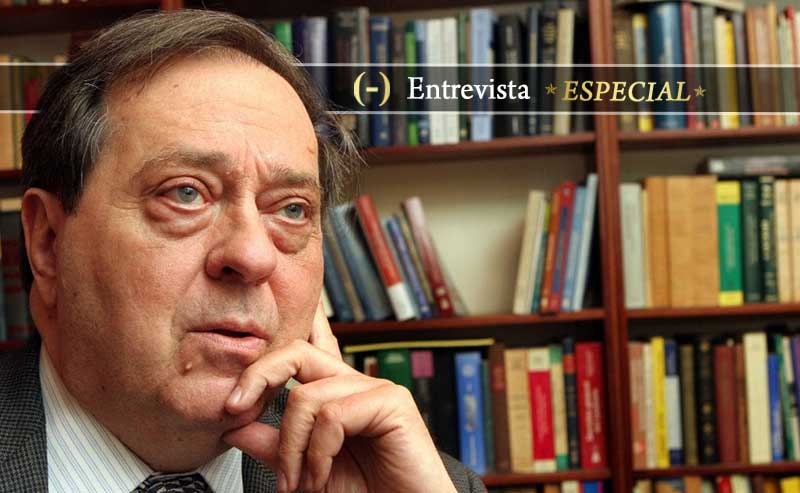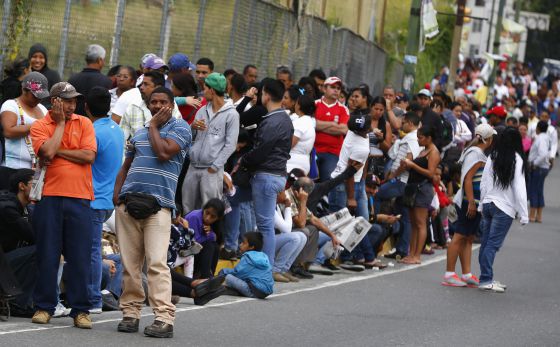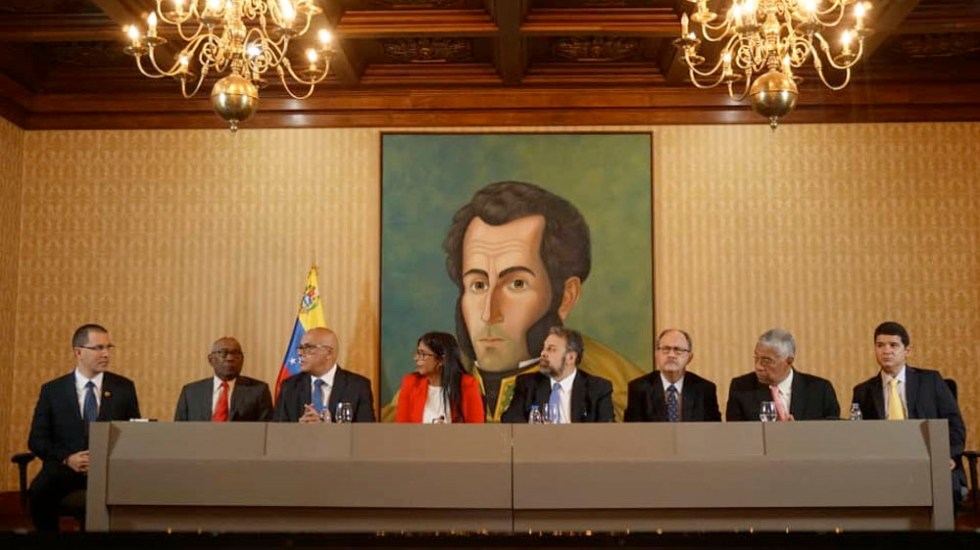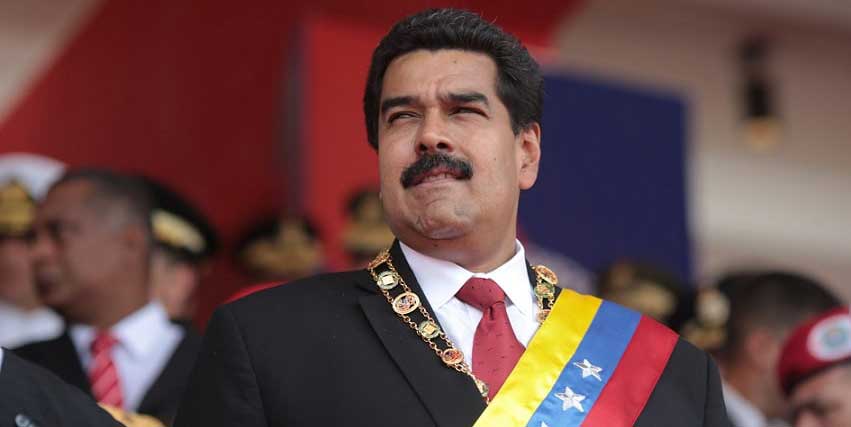Pedro Nikken: Dialogue Must be the Main Option, Not a Plan B (Interview)


Orinoco Tribune – News and opinion pieces about Venezuela and beyond
From Venezuela and made by Venezuelan Chavistas

As part of the special series, “A Negotiated Exit to the Crisis?” published by Supuesto Negado, we interview anti-Chavista Pedro Nikken (just a few days before his fatal accident), mediation specialist in international conflicts, former president of the Inter-American Court of Human Rights. We asked him about his assessment of the dialogue between the Venezuelan government and the opposition. He was blunt in his responses and little condescending to the two parties involved.
–
Pedro Nikken is Caracas born, in 1945, in the throes of World War II (less than two months before the nuclear explosions of Hiroshima and Nagasaki). He studied law in the Catholic universities Andrés Bello, Universidad de Carabobo and Paris II. Of social-Christian belief, he was an activist of Copei and took the path of international diplomacy until he became president of the Inter-American Court of Human Rights between 1983 and 1985, in a dark time in that field, since much of the continent was under de facto governments or just leaving them, in difficult transitions.
Nikken is part of a group of Venezuelans who have dedicated themselves, avidly, to promoting dialogue as a way out of the political conflict. In his opinion, at this moment there is no viable alternative for either of the conflicting two sectors, and he believes that every minute that passes is a waste because the suffering of the population in general is aggravated.

In the aforementioned group there are intellectuals, academics, politicians, influencers and journalists of both political tendencies and to date, after several months, they have managed to exchange ideas and carry out activities together, something that before seemed a very remote possibility.
In an exclusive interview with Supuesto Negado , he expressed his hope that talks sponsored by the Norwegian government will resume soon in which it will now be necessary to integrate the actors from the other [talks], which he calls “the little table,” a point that both the government and the forces that oppose it will have to resolve.
His opinion is qualified in the field of peacemaking through negotiations, since in his career in multilateral organizations he was part of commissions that worked in countries which were victims of genocides and civil wars, such as Rwanda, Burundi and El Salvador.
Can the negotiations sponsored by the kingdom of Norway continue? What perspective do you see?
I think they will continue, especially because they “have to” continue. I do not pretend to be especially optimistic, but there is no better scenario for the parties to seek agreements because they have no alternative. Or let’s say that the different alternatives are extremely expensive and in the end they will realize that they are obliged to negotiate. One of the points that has so far damaged the negotiations is that they have been seen as a kind of plan B, while plan A is to keep attacking, raise the tone. That will not lead to any results. I think that neither party really has a viable alternative other than coming to an agreement. That is why I am confident that it will happen. There have been demonstrations by President Maduro and the opposition people themselves of being willing to respond to a new call from Norway. I think that the Norwegians, knowing their trajectory and their commitment to these kinds of solutions, will insist. The problem is that, unfortunately, all these episodes are additional moments of suffering for the Venezuelan people. That should be kept a little more in mind by the people who are responsible for advancing the negotiation process.
What was the status of that process before the emergence of this alternative or parallel table in which some sectors of the opposition are participating, although not those that have had the leading role in recent months or years?
That is one of the issues that, indeed, will have to be resolved. This is an issue that, on the one hand, is the opposition’s because the decision arises from there and they will have to see how they resolve that issue. But it is also from the government because it implies a kind of bigamy. You cannot hold two negotiations in parallel, that is elementary. The government will have to make its decision. If they are saying that they will return to the table if Norway calls them, they should be aware that it is not possible to keep the “little table” at the same time. They cannot coexist. The opposition has to resolve [their split] or the government has to choose. Those are the challenges that are present.

Do you appreciate majority will in the opposition for a negotiated exit or is the dominating thesis all or nothing?
I think there is will for a negotiated exit. I cannot be very categorical because there have been somewhat ambiguous statements that say that if a negotiated exit is achieved it is fine, but if it is not achieved, it is also fine. That, in my opinion, is an unfortunate approach. You have to commit beforehand to negotiation. That is the only possible exit for the government and for the opposition also, by the way, and that is why it is the exit for the country. These days it was planned that Mr. John Carlin would visit us, a great journalist who wrote the book The Human Factor, which served as the basis for the movie Invictus, an intimate friend and confidant of Nelson Mandela. In one part of that book, he says that the key to the process was that it was possible to yield so that both sides won. That should also happen here because the situations of both at this time is very precarious, both the government and the opposition. A negotiated exit gives you a different field of action in which both sides can act in a more normal way in a normal society. It is something that suits everyone. The effort to reach an exit that consists in defeating the other is a mistake. Sadly, Venezuelan immigration authorities did not allow Carlin to enter the country. This fact registered as a more and unexpected collapse of the efforts that we have been undertaking together, people of the widest political and ideological spectrum, in stimulating a political and consensual solution to the very serious and prolonged Venezuelan crisis. Carlin is a broad connoisseur and co-participant of the admirable political management of Nelson Mandela, and was invited to share that experience with political actors as well as with broad sectors of civil society with whom we share the effort to underpin a negotiated solution. We have missed a great opportunity to learn from the Mandelian experience – and that of De Klerk as well, by the way. I can only say that what happened is an expression of the crisis we are experiencing. I find that what happened is incomprehensible and makes no sense, but I don’t want to speculate about possible causes or explanations, because doing so would contribute nothing to the sum of wills in support of a peaceful solution and our commitment to contribute to quieting the tone of the political debate. If I don’t have something good to say, I prefer not to say anything.
RELATED CONTENT: President Maduro Personality of the Year 2019 (Al Mayadeen)
At this time, what are the most sensitive points to restart a negotiation? What would be the fundamental point to be addressed?
The fundamental issue is that of a presidential election that ends the term of President Maduro. Of course that is the most contentious point because for the government any formula that includes that point would mean a capitulation, while for the opposition, any formula that does not include this point would also be a capitulation. It is there where one must be intelligent to pose things in the most acceptable way or, if you want, as least unacceptable as possible for everyone. I strongly disagreed with the way in which the elections of May 20, 2018 were called, but if it were simply that point, we would have to look for different possible formulas to solve it. It’s not just about that, but about observing the real situation of the government. The management of the Maduro government has reached a point where he can no longer govern the country. You can fight to stay in power, but how will you gain access to international credit or the restoration of trust after all that has happened? It seems to me that it is simply impossible. He will have to be a little generous. But we should not raise the issue as “get out of there because you are a usurper!” – because he cannot accept that. But you can look for consensus formulas. If only the two parties could change the verb “to confront” for the verb “to seduce”. Carlin’s presence would have served to highlight that because that was what Mandela did: he seduced his enemies, the savages of apartheid. It is what we should do, not to continue pummeling ourselves, but to treat ourselves as human beings, that although they can hate, they also have the capacity to love and it is time to put it into play.

What situation have you known or even led as a mediator comparable to that of Venezuela that had a happy ending?
Oops … Well, yes, that of El Salvador, which also began with many difficulties and lasted for two and a half years of negotiations. By the way, that also had an episode of an attempted “little table” that never transcended [the conflicts], but that after so long, I can tell the story. It happened that President Carlos Andrés Pérez took a parallel initiative to the one under development, which was borne by the Secretary General of the United Nations Organization (Javier Pérez de Cuéllar) and convened a dialogue in Caracas for both the Salvadoran Government and to the Farabundo Martí Front for National Liberation (FMNL). The idea was to present a draft agreement, something that was to be called the Caracas Act or Caracas Protocol. But the idea was immediately rejected by the FMLN, which did not agree to meet at a parallel table. In that process there were also moments of tension. The US president, George Bush (father), claimed the secretary general because, in his opinion, was biased for the guerrillas … But, in the end, the persistence of diplomacy was key. In addition, the situation was similar to what we have described in Venezuela, because neither party had a better alternative than that of a negotiated agreement. Schafik Handal (the FMLN leader) said: “We are not here to capitulate but because you could not win the war and because we couldn’t either.” That reflection comes to me like a beacon, every day. I wish that these political sides, who have been trying to destroy themselves and have only managed to destroy the country, get this into their heads. We must look for those paths of understanding. We no longer have time, the country is destroyed and we need to stop that process to reverse it. This time limitation is one of the great difficulties that negotiation has in this case. The clock is against us.
Translated by JRE/EF
You must be logged in to post a comment.